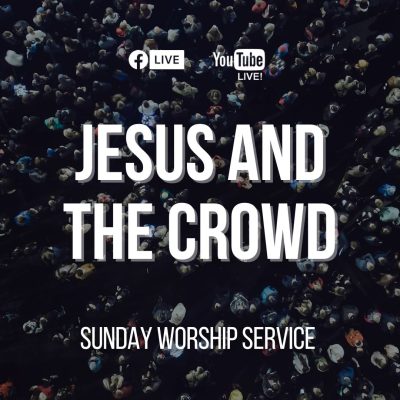Jesus constantly found Himself surrounded by crowds—people with mixed motives, questions, needs, and expectations. Yet He never lost His mission, His character, or His compassion. This message explores how His purpose, faith, truth, and mercy guide us to live with the same clarity and impact in the crowds we face every day.
1. Jesus Was Purpose-Driven
- He never entered a space without knowing why He was there.
- His mission governed His choices, not the expectations of the crowd.
- Hebrews 10:5–7 — “I have come to do your will, O God.”
- John 4 — Even hungry, He stayed laser-focused on God’s work.
Application:
- Are you clear about your purpose?
- Purpose changes how you see situations—problems become opportunities.
- A self-focused life collapses inward; a God-focused life transforms outward.
2. Jesus Recognized and Rewarded Faith
- The four friends tore through a roof to bring the paralyzed man to Him.
- Jesus didn’t compliment their creativity—He elevated their faith.
- Faith is not a feeling; it’s active trust.
- Faith creates transformation—paralysis becomes movement.
Application:
- Start recognizing faith in others the way Jesus does.
- Encourage the small steps, the sacrifices, the perseverance.
- Use gatherings (parties, workplaces, conversations) to highlight faith, not fashion, status, or performance.
3. Jesus Did Not Follow Religious Norms That Distorted Truth
- Question about fasting: the Pharisees wanted conformity, not understanding.
- Jesus refused to let tradition override truth.
- He taught: there is a time for everything, not everything all the time.
Application:
- Many of our “church expectations” are cultural, not biblical.
- Don’t elevate habits above Scripture.
- Be willing to confront anything—old or new—that gets in the way of God’s truth.
4. Jesus Always Spoke the Truth
- He confronted inner thoughts (vv. 8–10).
- He wasn’t swayed by status, setting, or audience size.
- He spoke with conviction but also discernment—meeting people where they were.
Application:
- Don’t live by lies—don’t feed them, accept them, or hide behind them.
- Truth is a seed—God makes it grow.
- Hard conversations are part of real discipleship and real love.
- Our unwillingness to speak truth often comes from fear, not faith.
5. Jesus Was Compassionate
- Compassion wasn’t mood-based; it was who He was.
- Even when rejected, attacked, or misunderstood, He didn’t change.
- Matthew 24:12 — “Because of the increase of wickedness, the love of most will grow cold.”
- God’s own self-description (Exodus 34) emphasizes mercy and steadfast love.
Application:
- Don’t let fatigue, hurt, or disappointment harden you.
- Keep doing good, even when unrecognized.
- Don’t stop serving when it becomes inconvenient.
- Compassion is most powerful when it costs something.
Conclusion
- Whether with one person or a crowd, Jesus moved with purpose, faith, truth, and compassion.
- Following His example creates impact far beyond our lifetime.
- When the church fails to reflect Jesus, the world rejects not Him—but us.
- This is our chance to rebuild the church’s witness by embodying His character in the crowds of our own lives.


